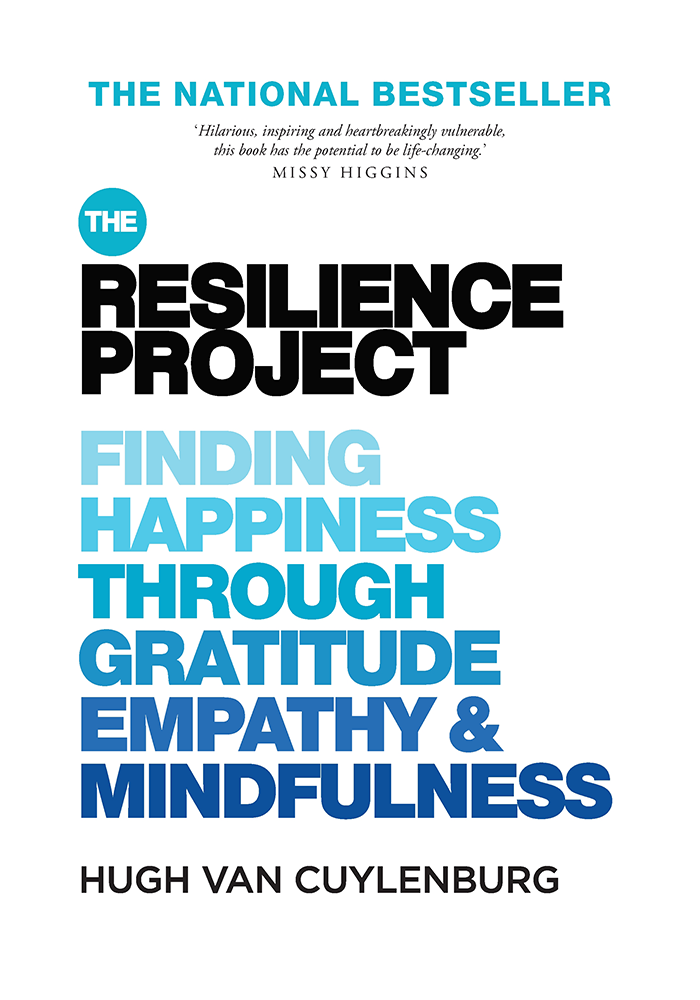How To Find Happiness Through Gratitude, Empathy & Mindfulness in "The Resilience Project" by Hugh Van Cuylenburg
With resilience, we learn how to effect positive changes in our lives, build stronger connections, and navigate life's challenges with greater strength and positivity. Read on to find out what Hugh Van Cuylenburg has to say about cultivating resilience in "The Resilience Project".

For most of us, resilience and happiness are elusive yet essential qualities that we seek to embrace. Life's challenges and uncertainties can often leave us feeling overwhelmed, questioning our ability to bounce back and find genuine happiness.
Drawing from his experiences as an educator and interactions with people from diverse walks of life, Hugh Van Cuylenburg unravels the secrets to building emotional strength and uncovering true contentment in his enlightening book, "The Resilience Project: Finding Happiness Through Gratitude, Empathy & Mindfulness".

By recounting his experiences and from reflection, Cuylenburg brings forth a powerful message that resonates with readers of all ages. He demonstrates that resilience is not just an inherent trait, but rather a learnable skill that can be nurtured through gratitude, empathy, and mindfulness. With heartwarming stories and practical insights, the book serves as a guide to unlocking the hidden potential within us and paving the way towards a more fulfilling and resilient life.
From understanding the influence of perspective to embracing the importance of building a support network, the lessons in this book inspire us to embrace positive change and lead a more purposeful life. Read on to delve into the power of gratitude, the transformative impact of empathy, and the art of mindfulness in shaping our perspectives and fortifying our emotional well-being.
What is the book "The Resilience Project" about?

"The Resilience Project: Finding Happiness Through Gratitude, Empathy & Mindfulness" by Hugh Van Cuylenburg is a book that delves into the concept of resilience and its connection to happiness. The author, Hugh Van Cuylenburg, is an educator and founder of The Resilience Project, an organization that aims to empower individuals with the skills and mindset needed to build resilience and improve their mental well-being.
In the book, Hugh shares his experiences from visiting some of the world's most impoverished communities, where he encountered people facing significant challenges and hardships. Despite their circumstances, he noticed that many of these individuals displayed remarkable levels of resilience and happiness. Intrigued by this observation, Hugh embarked on a journey to understand the keys to resilience and happiness.
Throughout the book, Hugh combines personal anecdotes, scientific research, and practical exercises to illustrate how these three pillars can be integrated into daily life. He emphasizes that resilience is a skill that can be cultivated, and by adopting these practices, individuals can improve their mental and emotional well-being.

The 3 Pillars of Building Resilience & Finding Happiness
Throughout the book, Hugh presents three essential pillars that contribute to building resilience and finding happiness:
1. Gratitude
Gratitude involves recognizing and appreciating the positive aspects of life, no matter how big or small. By practicing gratitude, individuals shift their focus from what they lack to what they have. This shift in perspective fosters a sense of contentment and happiness, even in the face of challenges or difficult circumstances. Embracing gratitude helps individuals cultivate a positive outlook and develop resilience in coping with life's ups and downs.
2. Empathy
Empathy is the ability to understand and share the feelings and experiences of others. By developing empathy, individuals build stronger social connections and form meaningful relationships. It enables people to offer support and compassion to others, creating a sense of belonging and community. Engaging in empathetic interactions not only benefits others but also enhances personal well-being and resilience by fostering a support network during difficult times.
3. Mindfulness
Mindfulness involves being fully present in the moment and observing thoughts and feelings without judgment. By practicing mindfulness, individuals can develop a greater sense of self-awareness and emotional regulation. Mindfulness helps in managing stress, reducing anxiety, and improving overall well-being. By staying mindful, individuals can better navigate challenges and respond to difficult situations with clarity and composure, contributing to their resilience and happiness.
10 Takeaways from the book "The Resilience Project"
1. The power of gratitude is strong.
In "The Resilience Project", Cuylenburg delves into the transformative power of gratitude and its profound impact on mental well-being and resilience. He explores the concept of gratitude and how practicing it can lead to increased happiness and a more positive outlook on life, and emphasizes its importance as a foundational pillar for building resilience and finding happiness.
Throughout the book, Hugh Van Cuylenburg shares inspiring stories and research on the positive effects of gratitude. He demonstrates how gratitude can be a powerful antidote to negativity, stress, and unhappiness, ultimately leading to greater resilience and improved mental well-being. By practicing gratitude regularly, readers can foster a deeper sense of contentment, joy, and appreciation for life's blessings, contributing to their overall happiness and emotional strength.
Hugh highlights how gratitude helps individuals shift their focus from what they lack to what they have. It encourages people to appreciate the positive aspects of life, even in the midst of challenges and difficulties. The practice of gratitude fosters a more positive and optimistic mindset. By regularly acknowledging and expressing gratitude for the blessings and positive experiences, individuals can enhance their overall sense of well-being.
There are many practical exercises that can help one start to incorporate gratitude into their daily lives. These exercises could include keeping a gratitude journal, expressing appreciation to loved ones, or reflecting on positive experiences. If you're looking for a place to perhaps start journaling or reflecting in, consider using Journey. As a digital diary app, you start your very own journal and write on whatever device you prefer — your laptop, your tablet or your phone. The convenience and portability of an online journal allows you reflect and journal on the go, anytime and anywhere.

If you're not sure about how to go about gratitude journaling, Journey also has some tools that you can help you get started:
- Gratitude Journal template - This template guides you to list things you are grateful for in your day, take note of the positive things that happened, what you look forward to, and reflect on how your days can be better.
- Gratitude Coach Program - Use Journey's Gratitude Coach Program to write down what you are grateful for based on the prompt of the day for a week to start increasing your satisfaction with life.
Make time to reflect on what you are grateful for. Think about the things in your life that you are grateful for. This could be anything from the people in your life, to your health, to the opportunities you have been given. To get the best out of this habit of gratitude journaling, be as specific as possible and try to include details about why each thing is important to you.
2. Empathy can create strong connections.
Cuylenburg emphasizes the profound impact of empathy in creating strong connections with others. He explores how developing empathy can enhance relationships, foster a sense of belonging, and contribute to overall well-being and happiness. By understanding and sharing the emotions of others, individuals can foster a sense of community and belonging, which contributes to their own well-being and resilience.
Hugh highlights how empathy involves putting oneself in the shoes of others and trying to understand their feelings, experiences, and perspectives. By doing so, individuals can form deeper connections and develop a sense of closeness with others.
When people show empathy towards others, it builds trust and creates a supportive environment. Empathy helps individuals feel understood and valued, which can lead to more open and meaningful interactions. The practice of empathy also contributes to emotional well-being, both for the empathizer and the person receiving empathy. Feeling understood and supported can provide comfort during challenging times and contribute to a greater sense of emotional balance. Empathy is often the first step towards showing compassion. When individuals connect with others on an empathetic level, it becomes easier to extend kindness and offer support.

3. Practice mindfulness to develop self-awareness.
Cuylenburg explores how mindfulness can help individuals become more in tune with their thoughts, emotions, and actions, ultimately leading to greater self-awareness and improved emotional well-being. Throughout the book, Hugh Van Cuylenburg shares insights on the benefits of mindfulness and its connection to self-awareness. By exploring the concept of mindfulness and how it can be applied in daily life, he encourages readers to develop a greater sense of self-awareness. Mindfulness can lead to improved emotional regulation, a deeper understanding of oneself, and enhanced overall well-being. It serves as a valuable tool for building resilience and finding happiness in the face of life's challenges. Being present in the moment also allows individuals to observe their thoughts and feelings without judgment, leading to better coping strategies and stress management.
Mindfulness enables individuals to observe their thoughts and emotions non-judgmentally. By becoming aware of their mental and emotional states, people can gain insights into their inner workings and patterns of thinking. Mindfulness helps individuals identify triggers that lead to certain emotional reactions. By being mindful of these triggers, people can better understand their responses and work towards healthier coping strategies.
Through mindfulness, individuals can learn to respond to their emotions in a more balanced and constructive manner. Mindfulness allows people to pause before reacting impulsively, which can lead to more thoughtful and measured responses.
4. Resilience as a learnable skill.
Cuylenburg, gathering from his experiences, drives the point that resilience is not an innate trait but a skill that can be cultivated and strengthened in his book. He emphasizes that with practice and the adoption of the three pillars (gratitude, empathy, and mindfulness), and intentional practices and mindset shifts, individuals can improve their resilience and bounce back from adversity.
Cuylenburg acknowledges that everyone faces adversity and difficult situations in life. However, he stresses that resilience is the ability to bounce back and navigate through challenges effectively. Resilience involves developing coping strategies to deal with stress, setbacks, and obstacles. By learning healthy ways to cope with difficulties, individuals can build emotional strength and adaptability.
Resilience is about recognizing that mistakes and failure are a natural part of life. Instead of viewing them as permanent setbacks, resilient individuals see them as opportunities for growth and learning. Cuylenburg also connects resilience to the practices of gratitude and mindfulness that he discusses in the book. Gratitude and mindfulness help individuals develop a positive outlook, reduce stress, and enhance emotional well-being, all of which contribute to resilience.

5. Simple acts of kindness have impact.
Acts of kindness, both given and received, have a profound impact on mental well-being. Engaging in acts of kindness towards others fosters a sense of fulfillment and connection, contributing to happiness and resilience. Cuylenburg emphasizes the profound impact of simple acts of kindness on both the giver and the recipient in the book. He explores how engaging in acts of kindness can create a positive ripple effect, leading to increased happiness, improved well-being, and stronger social connections.
Hugh highlights that small acts of kindness can have a ripple effect, spreading positivity to others. When individuals perform acts of kindness, it often inspires recipients to pay it forward, creating a chain reaction of goodwill. Engaging in acts of kindness can boost the giver's happiness and well-being. Doing something kind for others can lead to a sense of fulfillment and joy, enhancing the giver's mood.
Acts of kindness foster a sense of connection and community. When individuals show kindness, it creates a bond with others and promotes a feeling of togetherness. Hugh also emphasizes that acts of kindness do not need to be grand gestures. Even simple acts, such as offering a compliment, lending a helping hand, or listening attentively, can have a significant impact on others. The book encourages readers to incorporate acts of kindness into their daily lives. Whether at home, work, or in the community, small acts of kindness can make a difference in people's lives.

6. Don't undermine the influence of perspective.
The significant influence of perspective on how individuals perceive and respond to life's challenges can go unnoticed. Cuylenburg explores how reframing negative situations and adopting a more positive perspective can have a profound impact on one's well-being and resilience in his book. He finds, and experiences, that shifting one's perspective can be a powerful tool in coping with challenges. By reframing negative situations and focusing on the positive aspects, individuals can build a more resilient mindset.
Hugh highlights that the way individuals interpret and view life events can greatly influence their emotional responses. The same situation can be perceived differently based on one's perspective, leading to varying emotional reactions. Changing one's perspective on challenges can help individuals cope more effectively. By viewing challenges as opportunities for growth and learning, people can approach them with a more positive and resilient mindset.
A positive perspective, rooted in optimism, can enhance resilience. Optimistic individuals tend to view setbacks as temporary and specific, rather than permanent and all-encompassing, which can foster greater emotional strength. The book also emphasizes the importance of choosing beliefs that empower and uplift. By adopting beliefs that support personal growth and resilience, individuals can navigate challenges with greater confidence. Hugh goes on to discusses the influence of self-talk on one's perspective. Positive self-talk can foster a more compassionate and encouraging inner dialogue, which can enhance overall well-being.
7. Build a support network.
The book explores how seeking support from others and nurturing positive relationships can contribute to emotional strength and happiness. Nurturing strong social connections and seeking support from others during difficult times enhances resilience. Building a support network provides a safety net and encourages individuals to share their feelings and experiences.
Hugh highlights the value of social connections in promoting emotional well-being. Building a support network involves forming meaningful and positive relationships with others. Having a support network provides individuals with a safe space to share their emotions and experiences. Expressing thoughts and feelings with trusted friends or family members can alleviate stress and emotional burden. Building a support network is a two-way street. Not only can individuals seek support when they need it, but they can also offer support to others. Being there for others can foster a sense of purpose and fulfillment.
A support network also helps to combat feelings of isolation and loneliness. Being part of a community where individuals feel understood and cared for can have a positive impact on mental well-being. Hugh encourages readers to seek support from various sources, including family, friends, colleagues, or support groups. Diverse support systems provide a range of perspectives and help individuals access different types of support. A support network can have a positive influence on one's mindset and behavior. Surrounding oneself with supportive and uplifting individuals can inspire optimism and resilience.
While a support network is crucial, Hugh also emphasizes the importance of maintaining a sense of independence. Striking a balance between relying on others for support and developing individual coping strategies is key to building resilience.

8. Focus on what matters most.
The book encourages readers to prioritize what truly matters in life and let go of unnecessary stressors. Through his experiences, Cuylenburg reflected upon and explored the concept of prioritizing values, relationships, and meaningful experiences to enhance happiness, well-being, and resilience.
Hugh encourages readers to identify their core values and what is truly important to them. By understanding their values, individuals can align their actions and decisions with what matters most in their lives. Focusing on what matters most involves setting priorities. It means devoting time and energy to activities, relationships, and goals that align with one's values and contribute to overall well-being.
He also discusses the importance of minimizing distractions that can divert attention from what truly matters. By being mindful of time spent on less meaningful pursuits, individuals can redirect their focus to what brings them joy and fulfillment. Cuylenburg talks about the importance of living fully, authentically, and aligning actions with values. When individuals live in harmony with their core beliefs, they experience a greater sense of purpose and contentment.
Simplifying life by eliminating unnecessary complexities and material pursuits can lead to greater focus on what truly matters. Embracing simplicity allows individuals to appreciate the little joys and cherish meaningful experiences. Focusing on what matters most involves being present and fully engaged in the current moment. By practicing mindfulness and savoring life's experiences, individuals can find greater fulfillment.
9. Take responsibility for your happiness.
Happiness is not solely dependent on external factors. The book emphasizes the importance of taking responsibility for one's own happiness by adopting practices like gratitude, empathy, and mindfulness. Hugh encourages readers to choose a positive mindset and actively look for the good in life. By adopting a growth mindset and focusing on possibilities, individuals can cultivate happiness.
Taking responsibility for happiness involves letting go of negativity and embracing a more optimistic outlook. Dwelling on negativity and grievances can hinder happiness and resilience. Taking responsibility for happiness also means actively seeking out experiences that bring fulfillment and joy. Engaging in activities aligned with one's passions and values contributes to happiness.
Hugh emphasizes the importance of self-compassion in the pursuit of happiness. Treating oneself with kindness and understanding during difficult times fosters emotional resilience. Hugh talks about recognizing one's personal agency in shaping their own happiness. While external circumstances may impact emotions, individuals have the power to choose how they respond to those circumstances. Taking responsibility for happiness also means taking positive actions to improve well-being. Engaging in self-care, maintaining healthy relationships, and pursuing passions are examples of positive actions.

10. Small changes can yield significant results.
In "The Resilience Project: Finding Happiness Through Gratitude, Empathy & Mindfulness," Cuylenburg discusses the transformative power of making small changes in one's life. He explores how even minor adjustments to thoughts, actions, and habits can lead to significant and positive results.
Implementing small, positive changes in daily life can lead to significant improvements in happiness and resilience over time. Consistent practice of the three pillars contributes to overall well-being. Hugh explains that making small changes can create a positive momentum for personal growth and well-being. When individuals experience success with small changes, it motivates them to continue making progress. Taking small steps towards positive change allows individuals to build up their resilience and capacity for growth. Incremental progress can be more sustainable and manageable than trying to make drastic changes all at once.
Making small changes can result in a shift in perspective and attitude. By adopting more positive and proactive behaviors, individuals can see life from a new and optimistic lens. Emphasizing small changes encourages mindfulness in daily actions. Being mindful of thoughts and behaviors allows individuals to make intentional choices that align with their values and goals.
"The Resilience Project" is not only a book but also a movement that has inspired many individuals, schools, and organizations to focus on building resilience and promoting positive mental health. It offers valuable insights and actionable steps to help readers cultivate gratitude, empathy, and mindfulness.
Through the book, readers can learn how to create positive changes in their lives, build stronger connections with others, and develop the resilience needed to navigate life's challenges with greater strength and positivity. This book is a reminder that happiness and resilience are within our reach, and with dedicated effort, we can lead more fulfilling and meaningful lives.


